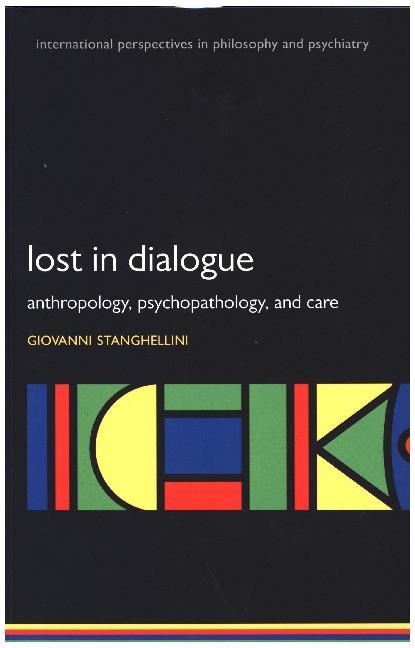Read more
Zusatztext Stanghellini has written an interesting addition to the International Perspectives in Philosophy and Psychiatry series. It is heavily weighted to psychodynamic and phenomenological thought, and conceptually has depth and strength. Informationen zum Autor Giovanni Stanghellini, MD and Dr. Phil. honoris causa, psychiatrist and psychotherapist, is professor of Dynamic Psychology and Psychopathology at "G. d'Annunzio" University (Chieti, Italy) and Profesor Adjuncto "D. Portales" University (Santiago, Chile). He chairs the World Psychiatric Association (WPA) Section on Psychiatry and the Humanities, and the Association of European Psychiatrists (EPA) Section on Philosophy and Psychiatry. He is also founding chair of the Scuola di Psicoterapia e Fenomenologia Clinica (Florence). Among his books, all published by Oxford University Press: Nature and Narrative (co-edited with KWM Fulford, K. Morris and JZ Sadler, OUP 2003), Disembodied Spirits and Deanimated Bodies. The Psychopathology of Common Sense (OUP 2004), Emotions and Personhood (with R. Rosfort, OUP 2013), One Hundred Years of Karl Jaspers' General Psychopathology (co-edited with T. Fuchs, OUP 2013) and the Oxford Handbook of Philosophy and Psychiatry Klappentext The field of psychiatry has long struggled with developing models of practice; most underemphasize the interpersonal aspects of clinical practice. This essay is unique in putting intersubjectivity front and centre. It is an attempt to provide a clinical method to re-establish the fragile dialogue of the soul with oneself and with others Zusammenfassung The field of psychiatry has long struggled with developing models of practice; most underemphasize the interpersonal aspects of clinical practice. This essay is unique in putting intersubjectivity front and centre. It is an attempt to provide a clinical method to re-establish the fragile dialogue of the soul with oneself and with others Inhaltsverzeichnis PART ONE: ANTHROPOLOGY: WHAT IS A HUMAN BEING? 1: We are dialogue 2: The primacy of relation 3: The cradle of the dialogic principle 4: The life-world of the I-You relation 5: The innate You: the basic package 6: The dialogue with alterity: narratives and the dialectic of identity 7: A closer look into alterity: eccentricity 8: The Uncanny and the secretely familiar double 9: Epiphanies of alterity: drive 10: Habitus: the emergence of alterity in social situations 11: Emotions: the person in between moods and affects 12: A closer look at moods and affects: intentionality and temporality 13: Emotions and the dialectic of narrative identity 14: Alterity and the recoil of one's actions 15: Alterity and the other person: the anatomy of recognition 16: The basic need for recognition 17: A logic for recognition: heterology 18: An anthropology of non-recognition PART TWO: PSYCHOPATHOLOGY: WHAT IS MENTAL DISORDER? 19: First steps toward the person-centered, dialectical model of mental disorders 20: What is a symptom? 21: The truth about symptoms 22: Symptom as cypher 23: Conflicting values: the case with post partum depression 24: The body as alterity: the case with gender dysphoria 25: The trauma of non-recognition 26: Erotomia and idolatrous desire 27: Depression and the idealization of common sense desire 28: Borderline and the glorification of a thrilled flesh 29: Schizophrenia and the disembodiment of desire PART THREE: THERAPY: WHAT IS CARE? 30: The portrait of the clinician as a globally minded citizen 31: The chiasm 32: The P.H.D. method 33: Empathy and beyond 34: Second-order empathy 35: Unfolding 36: Position-taking 37: Responsibility 38: Perspective-taking 40: What is a story? 41: Personal life-history 42: Intimacy EPILOGUE: DIALECTIC METHOD AND DIALOGUE ...

